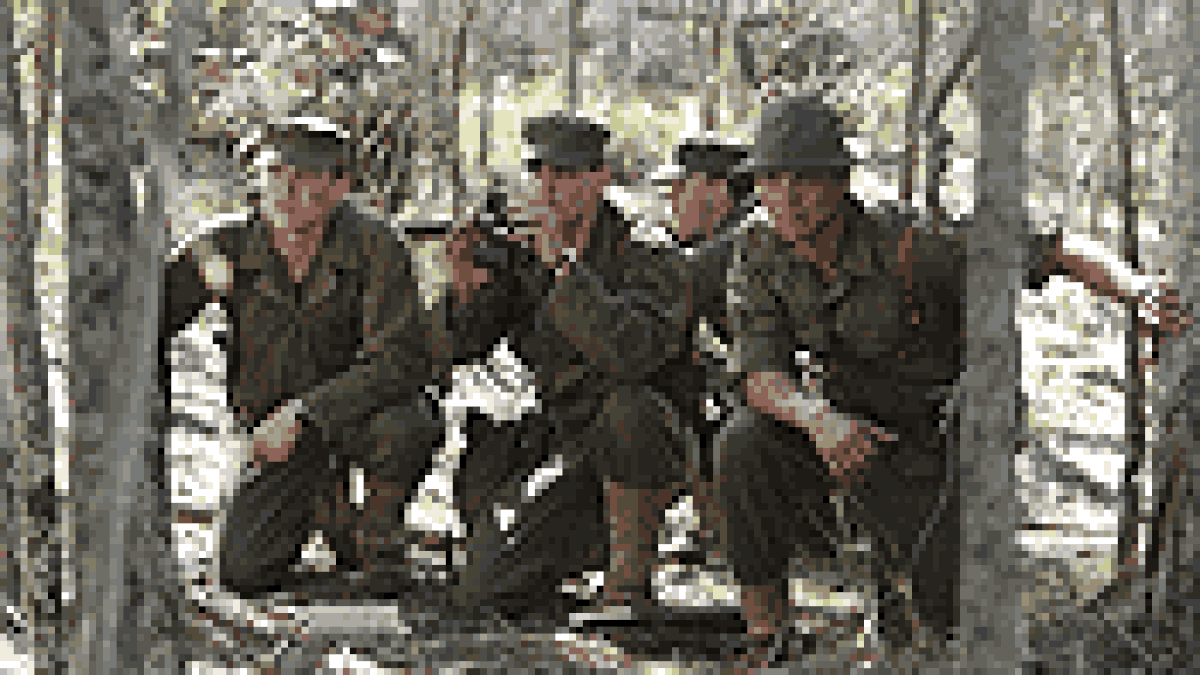“The most daring rescue mission of our time is a story that has never been told,” boasts the poster for The Great Raid. The credits of the film, however, reveal that it’s based on not one, but two books about the 6th Ranger Battalion, which ventured thirty miles into enemy territory to free more than five hundred men from a Japanese POW camp in 1945. While it’s true that a lot of people don’t read books anymore, it nonetheless appears that Miramax’s definition of “never” is about as fluid as Bill Clinton’s definition of “is.”
When it comes to World War II movies, you may never have seen one like this before — if only because it’s like three different movies at the same time. In the main story, Captain Prince (James Franco) and Lieutenant Colonel Mucci (Benjamin Bratt) plan to liberate the American GIs in the Cabanatuan prison camp, as it is believed — with good reason — that the Japanese will execute every last one before retreating. (We’ve already seen them do it at another camp, where they herded the prisoners into air-raid shelters, rolled in barrels of gasoline, and set them ablaze, shooting anyone who emerged.)
Meanwhile, we also follow the story of those in the camp, who don’t know that imminent death awaits — in fact, they assume that imminent rescue is coming. The question is whether that will happen soon enough to save the life of malaria-stricken Major Gibson (Joseph Fiennes) or to prevent rash actions by Captain “Red” Redding (Marton Csokas), who doesn’t care that if he’s caught escaping, ten others will be killed in retaliation.
Gibson survives on small doses of quinine smuggled into camp by an underground resistance force based in the Philippines. One of their most crucial agents is Margaret Utinsky (Connie Nielsen), formerly married to a friend of Gibson’s, though both are clearly in love with one another and may yet do something about it once the war is over. Her story is the third one followed here, as she evades capture from the Japanese military police who are slowly closing in on the organization.
At about the halfway mark, The Great Raid narrows its focus, forgetting about Margaret and Gibson to focus exclusively on Prince and Mucci. This is an awkward transition, not just because Margaret’s story is the most interesting of the three, but also because there hasn’t really been time to learn who all of Gibson’s men are (most are played by unfamiliar actors). So when one of them dies late in the game and a big deal is made out of it, you may find yourself wondering “Wait, who is that? Why do we care again?” Obviously, we’re supposed to care because the music tells us to. But had the movie focused exclusively on this group, there might have been more time to know each man a little better.
As for the prisoners, their story is compelling but very, very Hollywood. For a man dying of malaria, Fiennes shivers impressively but also talks too much. In particular, a scene in which he enlists the help of a colleague to write a last letter to Margaret feels excessively melodramatic. Gibson gives a standard-issue speech about how he doesn’t know what to say to her, that he’s started several letters but torn them all to pieces because they couldn’t truly express how he feels, and he has no idea how to begin. His colleague, in cutesy fashion, responds that he should begin with “Dear Margaret.” Do any real soldiers talk this way?
The evil prison camp supervisor is also a very Hollywood villain, with a white collar to helpfully identify him. The only thing that doesn’t fit the formula with him is that his final showdown is not with any of the POWs, but with one of the liberators.
The Japanese throughout are portrayed as pure evil — wide-eyed maniacs who despise American captives for surrendering, are racist against Filipinos to the point of not taking them seriously as adversaries, and, in one prison scene with Margaret, appear to lust after the white woman. Some of this stuff feels over-the-top; then again, it is refreshing that The Great Raid doesn’t feel the need to be a politically correct and evenhanded portrayal of all viewpoints, as Michael Bay’s Pearl Harbor did. It’s not as though the Japanese were exactly in the right.
The nighttime raid itself plays out like a video game: Aim, pull the trigger, stuff go boom. We’re probably supposed to understand the strategy of it after watching a scene in which Prince draws an illegible diagram in the sand with a stick, but really, it’s just people shooting. And since director John Dahl never took much time to introduce us to his soldiers, mustering tension over their struggle isn’t easy.














